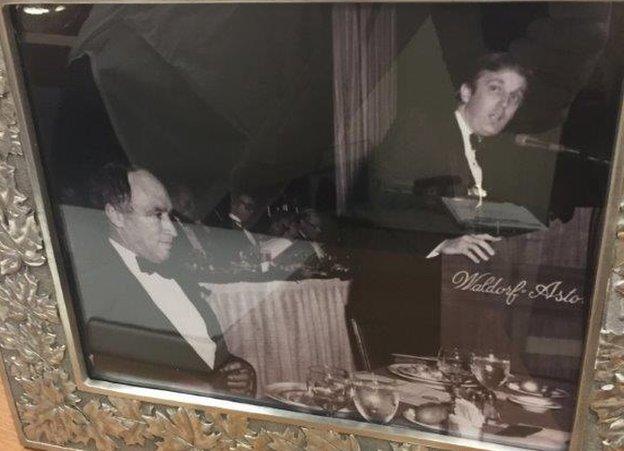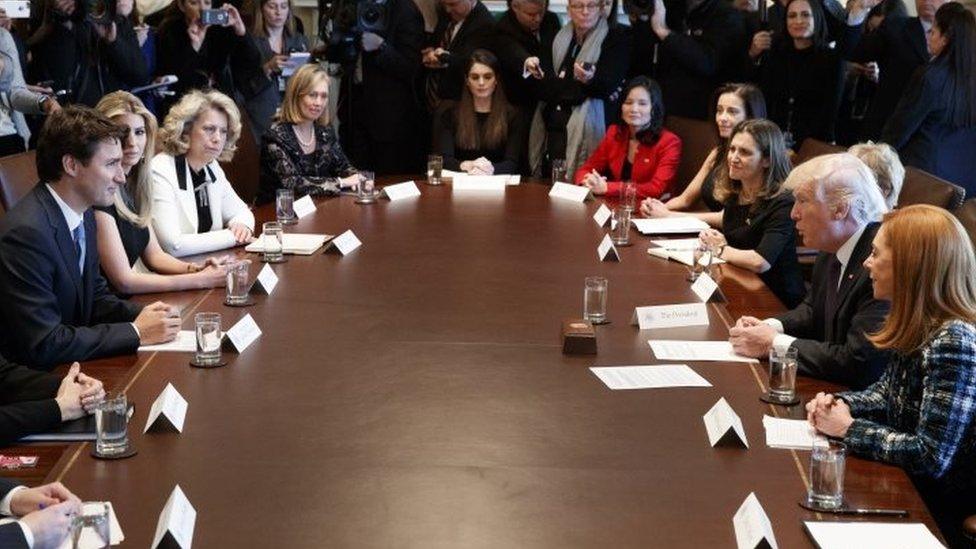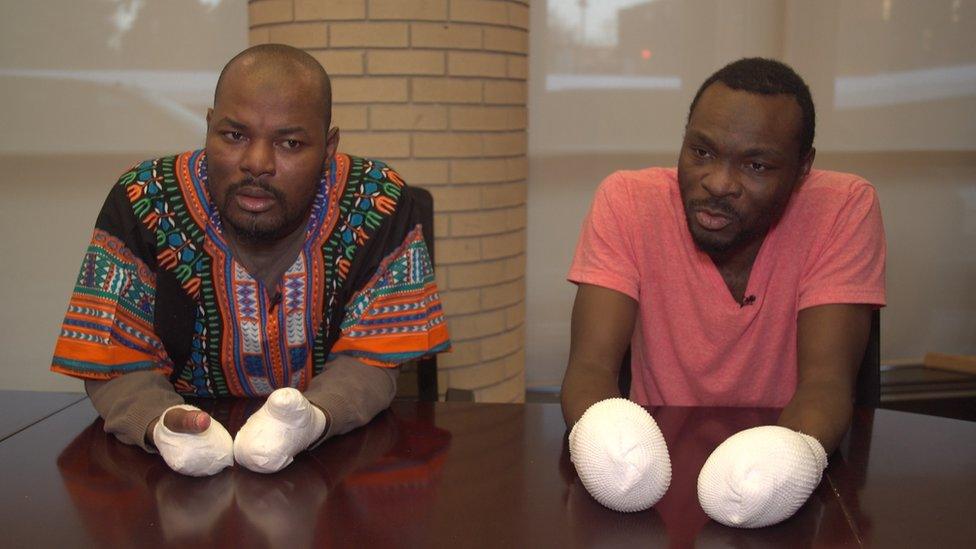Justin Trudeau: I won't lecture Trump over refugee ban
- Published
Justin Trudeau was asked to comment on Donald Trump's migrant ban.
Canadian Prime Minister Justin Trudeau has said he will not lecture President Donald Trump on Syrian refugees.
"The last thing Canadians expect is for me to come down and lecture another country on how they choose to govern," he said at the White House.
Both leaders stressed the countries' shared economic goals and co-operation at a joint news conference.
But their responses to questions about Syrian refugees underscored their contrasting policies on immigration.
Mr Trump defended his controversial travel ban, saying he wanted "to have a big beautiful, open door", but that "we cannot let the wrong people in".
The US president has stirred controversy for issuing an executive order temporarily banning entry of all refugees and visitors from seven mainly Muslim countries.
A federal judge has issued a temporary nationwide block on the travel ban, but the issue of refugees appeared to overshadow the joint news conference.
The US president and Canadian prime minister shake hands and grab shoulders
Mr Trudeau said the US and Canada had always been strong allies, fighting alongside one another on various battlefields.
"But there are times when we have differed in our approaches. And that's always been done firmly and respectfully," he said.

Balancing act - Analysis by Jessica Murphy, BBC News, Toronto
Justin Trudeau had a fine line to walk on Monday and came through with his best diplomatic balancing act.
The prime minister can travel back to Ottawa with Mr Trump on the record as having called the trade relationship between the two nations "outstanding" and only in need of a "tweaking".
What those tweaks might entail is still to be revealed, but you could almost hear anxious Canadian businesspeople breathing a sigh of relief.
This first face-to-face meeting also offered a clue at how far Mr Trudeau was willing to go preserve those vital trade ties.
Mr Trudeau refused to bite when the press repeatedly baited him to criticise his host on thorny issues like immigration, though many of his own policies stand as a reproach to those of the new US president.

The prime minister added that Canada continues to "pursue our policies of openness" without compromising security and would serve as a "positive example in the world".
The Canadian leader made global headlines for accepting nearly 40,000 refugees, and has said his country will welcome those fleeing persecution and war.
US refugee ban: Canada's Justin Trudeau takes a stand
When Mr Trump signed the controversial order, Mr Trudeau tweeted his government's commitment to bringing in "those fleeing persecution, terror & war".
He also sent a pointed tweet that showed him greeting a young refugee at a Canadian airport in 2015.
The facts on the North American Free Trade Deal
"This is a delicate situation here I don't think it would help anyone in this country if the prime minister went to the US and started a fight," said Opposition Conservative leader Rona Ambrose.
The two men, however, emphasised their commitment to provide growth and jobs for people on both sides of the northern border.
"We will co-ordinate closely to protect jobs in our hemisphere and to keep wealth in our continent," said Mr Trump.
Mr Trudeau gave Mr Trump a framed photograph of the US president and the prime minister's father, Pierre Trudeau.
The picture was taken in 1981 when the then-Prime Minister Pierre Trudeau received an award in New York City, according to the prime minister's office.

Mr Trudeau's father, Pierre Trudeau, appears with Mr Trump in New York City in 1981
The US president's pledge to renegotiate free trade deal Nafta has reportedly unsettled Canadian officials - 75% of the country's exports go to the US.
The two leaders, and Mr Trump's daughter Ivanka, also led a roundtable discussion on female workers.

The roundtable focuses on advancing women in the workplace, officials say
The neighbouring countries launched a new task force called the United States Canada Council for the Advancement of Women Business Leaders-Female Entrepreneurs.
Ivanka Trump, who appealed to working women throughout her father's presidential campaign, helped secure female executives to participate and set the agenda for the meeting.
The joint task force may help allay tensions over some of the protectionist measures Mr Trump has issued since he took office in January.

US migrants flee to Canadian border

Razak Iyal and Seidu Mohammed
It was a cold that Seidu Mohammed and Razak Iyal could barely comprehend.
On Christmas Eve, they found themselves struggling through a waist-deep field of snow in a rash night-time bid to sneak across the Canada-US border.
The two men had met a just few hours before at a Minneapolis bus station and both faced deportation back to Ghana after being denied refugee status in the US.
They had heard through a network of other refugees and African expats that if they could get into Canada, they had a second shot at asylum in the north.
By the time they reached Highway 75 in Manitoba, their hands had frozen into claws. They could not reach the phones in their pockets to dial 9-1-1 as planned. Mohammed's eyes had frozen shut.
Read the full story here: US migrants seek refugee status in Canada
'I lost all my fingers': Asylum seekers make dangerous border crossing